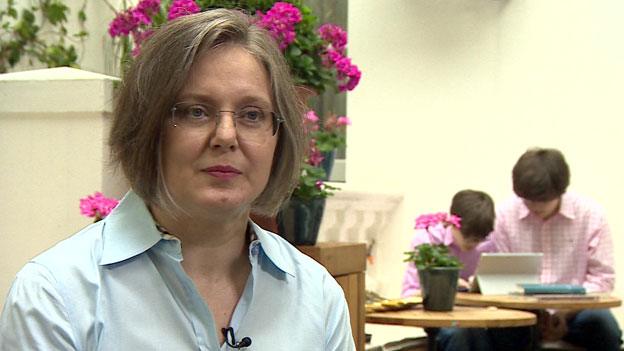Council drops home education case
- Published

Sophie Sotello has opted to home educate her son Gabriel
A London council has withdrawn an order forcing a mother to send her home educated child to school.
Kensington and Chelsea Council won an earlier case against Sophie Sotello in the magistrates' court after she refused to comply with the order.
When she appealed against the decision, the council dropped its case.
It said that it was now satisfied with evidence showing that her son, 11-year-old Gabriel Sotello, was receiving a suitable education.
Gabriel Sotello is one of more than 21,000 children on local council records as being home schooled.
According to the home education group Ed Yourself numbers have grown rapidly - by 17% between July 2013 and July 2014.
Many of these pupils, like Gabriel, have never been to school. Others have been taken out because their parents felt they were being bullied, neglected or were not reaching their potential.
Home schooled children do not have to follow the national curriculum or take part in public exams such as GCSEs or A-levels.
Mrs Sotello says her role is not to teach Gabriel, but to point him in the right direction.
"I wouldn't dream of saying I teach him," she says. "I facilitate, I find the books, I research with them, I give them the power if you like. It is child centred, finding out what makes them tick."
Gabriel initiates much of his own learning and says he is inspired by the freedom to focus on what most interests him.
"Freedom is what makes learning still fun," he says. "In home education you can learn at your own pace and you do learn much quicker."
Parents give various reasons for shunning school, and taking direct responsibility for educating their children.
Jackie Fahy, who organises a weekly meeting in a London park for like-minded parents, says some doubt the worth of the regimented school curriculum.
"A lot of children come out of school not prepared. The workplace is changing so rapidly that actually the school system is huge and vast and slow to change. I'm not sure that children will be prepared for having several careers in a lifetime."
Elizabeth Lil - who opted to educate her son and daughter herself - says that as a former teacher she felt that barely a tenth of her time in school was actually benefiting children.
"I was a science teacher, I did maths. I've so far used trigonometry once in my adult life. What you learn at school is not necessarily the skills you need for your adult life."
These parents complain that councils are exceeding their powers by carrying out routine inspections of the quality of their children's education.
They insist that councils should intervene only if they have evidence that something is wrong.
But grey areas persist over exactly what councils can or should do.
Government guidance is clear that local authorities have no statutory duty to investigate the education children are receiving at home on a routine basis.
It says that parents are not legally obliged to cooperate with requests from councils for information.
The guidance tells councils not to confuse home education with truancy.
But it acknowledges that if councils are concerned then they might impose the sort of school attendance order sent to the Sotellos.
In a statement, Kensington and Chelsea Council acknowledged the right of parents to educate their children at home.
But it said "when this happens we believe that we have a duty of care to establish that the child is receiving a suitable education".